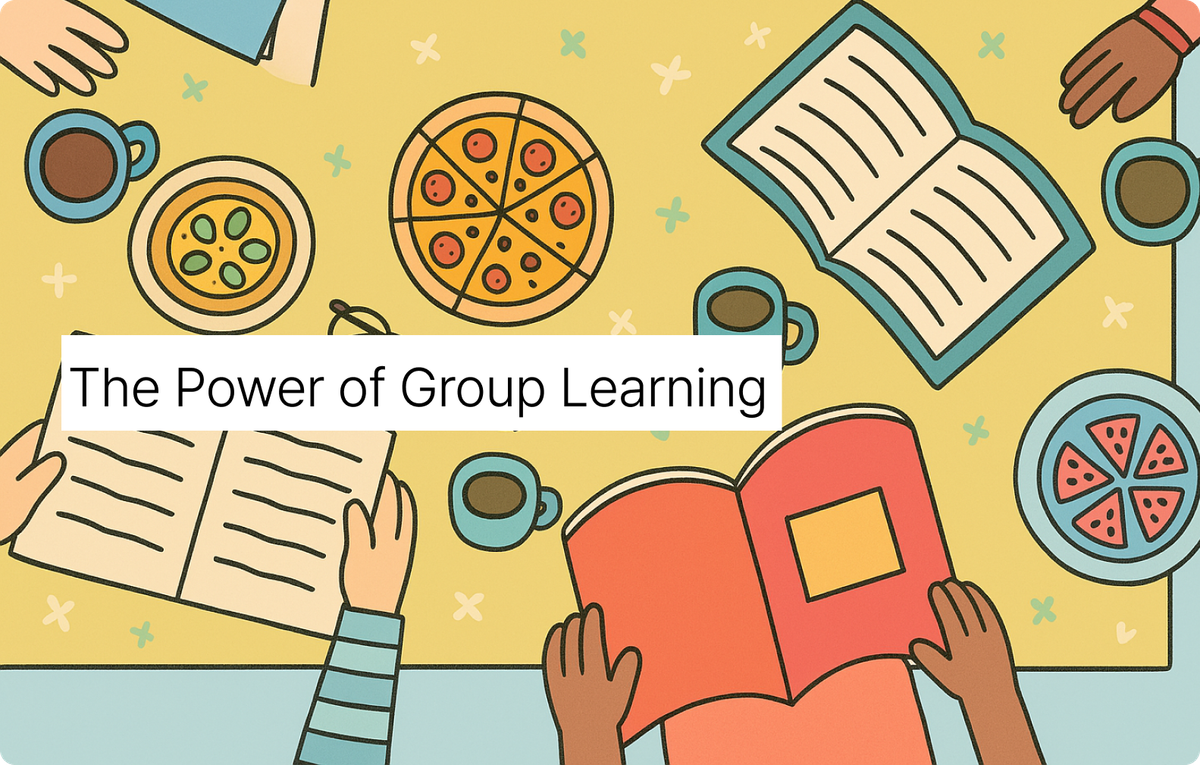The Power of Group Learning in Reading Groups and Book Clubs
Reading with others can boost your motivation, comprehension, and critical thinking. Whether through book clubs or study groups, group learning creates a more engaging and rewarding experience.

Whether through study groups, book clubs, or collaborative projects, learning together offers you unique benefits that individual study cannot replicate.
Let’s explore different factors of group learning in relation to reading!
What’s the science behind group learning?
Research evidence shows that collaborative learning can increase your engagement, motivation, and academic achievement through active participation and peer support.
Group learning enhances student interest, motivation, success, creativity, understanding and equality. (Vrioni, 2011)
According to Vrioni's (2011) research on the effects of group learning:
- You show greater persistence and productivity when working in groups.
- Social interaction built around academic work leads to higher achievement.
- Your feelings of personal responsibility to the group increases.
What makes book clubs & study groups effective learning tools?
Books clubs impact your reading comprehension and critical thinking skills.
Reading and developing critical thinking skills are symbiotic because engaging in reading helps students to develop reasoning abilities. (Rusiana et al., 2024)
They can also can foster your love for reading out of enjoyment.
Group learning encourages your autonomy. Choosing your text and who you read with can lead to increased motivation and comprehension skills (Kline, n.d.).
In an English as a Second Language (ESL) classroom, it can increase your interaction in English. It also turns the teacher’s role into a motivator or problem solver. (Yansyah, 2011)
What are effective study group and book club strategies?
1) Blended activities can improve your critical thinking skills.
Activities such as silent reading and interactive sharing can encourage reading comprehension and participation (Rusiana et al., 2024).
If you include a writing section, you can share your thoughts based on your written reflections.
Using different methods helps you analyze texts from multiple perspectives while building both mental connections and social relationships.

2) Choose texts and study partners that interest you.
When you get to choose your own book and study partner(s), you're more likely to enjoy and engage with the material.
In one case study, 32% of students said this was their favorite part of book clubs. Another 32% enjoyed the presentation project, and 28% enjoyed working with classmates the most (Kline, n.d.).
When you select texts that genuinely interest you, you'll find yourself more motivated to read and better able to understand the material.
Research shows that your comprehension skills improve when you study materials you find engaging (Ahmada, 2020).
3) Use reading logs to track your progress.
Instead of relying on workbooks or textbooks, try keeping a reading log to enhance your thinking skills.
Track when you read each book and write down your thoughts and reflections about them.
4) Share responsibilities.
If you're organizing a group, try assigning different roles to each member.
This approach works better than having one person lead all the time, and helps everyone stay engaged and involved.
You can break down the roles even further for moderating, sharing, summarizing, reading different sections, and so on. (Vrioni, 2011)
How can you start your own study group or book club?
Go digital - Online meet ups.
Consider starting an online book club or study group. You can easily connect with others through online platforms and discussion forums, making learning together more accessible than ever.

Make it social.
Turn it into a fun activity with your colleagues, classmates, or friends.
When you keep it voluntary, you'll find yourself more motivated and build stronger connections with others. Read more about motivating yourself to read here.
Conclusion
Whether you join a study group or book club, you'll find group learning to be a powerful tool for enhancing your educational journey and everyday life.
As research demonstrates, when you learn collaboratively, you'll experience increased engagement, motivation, and academic achievement while developing your critical thinking skills.
By participating in structured group activities and using effective tools, you can create more meaningful educational experiences and become part of a supportive learning community.
Happy reading!
References
Vrioni, R. (2011). Effects of group learning on the academic performance of university students. Problems of Education in the 21st Century, 33, 111-117. Accessed at: [Link]
Rusiana, Nuraeningsih, Sulistyowati, T., Syafei, M., Romadlon, F. N., Nurcahyo, A. D., Agulan, L. P., Thongmark, N., Anna, S., Kurt-Taşpınar, H., & Milad, A. A. (2024). Book clubs as a pedagogical tool for developing critical thinking: Evidence from an English education program in Indonesia. International Journal of Online and Learning in Education, 6(3). Accessed at: [Link]
Yansyah, E. A. (2011). The use of group work activities to improve students' reading comprehension at language program of MAN 1 Pekanbaru [Thesis]. Accessed at: [Link]
Kline, D. (n.d.). Implementation of book clubs and its effects on student motivation. FAU Lab Schools Teacher Research. Accessed at: [Link]
Ahmada, A. (2020). Using group work to improve students' reading comprehension skill. Journey (Journal of English Language and Pedagogy), 3, 14-18. Accessed at: [Link]




